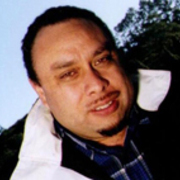
Bradford Haami
Originally from Whakatāne, Bradford Haami graduated from the Māori journalism course at the Waiariki Institute of Technology in Rotorua (then Waiariki Polytechnic) in the mid-80s.
Haami began his television career as a journalist with the Māori programmes department at Television New Zealand. As well as working on shows such as Koha, Marae, Waka Huia and the inaugural Māori Sports Awards, he was one of the original creators and directors of TVNZ's popular youth culture show Mai Time.
In 2001 Haami co-wrote and directed (with Ngamaru Raerino) relationship tale He Poraruraru, an episode of te reo anthology series Aroha.
Haami was co-writer, co-creator, and co-producer with Carey Carter of award-winning anthology series Mataku, which first debuted in 2001. Hosted by Temuera Morrison, the show was described as a "Māori Twilight Zone", and dealt with Māori experience of the "unexplained".
Haami was also involved in the development of drama series Waimarie, for Māori Television, and was a director/ writer for TV3 youth show Pacific Beat Street. He contributed story-lines to satirical show Spin Doctors, and was a Māori advisor and associate producer on 2006 Māori documentary-drama series Taonga.
Haami's freelance work includes involvement in a range of screen productions, including many documentaries. Among them, he was writer of a high-rating 2002 documentary on Māori humour, Pukukata: The Last Laugh. He directed one-hour Ngā Tokotoru, and was writer and reporter for this 2002 documentary on legendary entertainer Dalvanius Prime.
Haami has been a script consultant and editor to many TV and movie scripts with Māori content, including Shortland Street, Mercy Peak, Kaitangata Twitch, Matariki, and Rena Owen project Behind the Tattooed Face, as well as co-productions Tracker and telemovie The Man Who Lost His Head.
In 2007, Haami researched and wrote document ‘Urutahi Koataata Māori: Working with Māori in Film and Television’ for Ngā Aho Whakaari — the national representative body for Māori working in film, video and television in New Zealand. This pioneering text explores the challenges and benefits of making film and television according to Māori ethical protocol.
Based in Waitakere, Haami is a researcher and university lecturer in Māori studies. He has written extensively about Māori history and culture with a string of books, articles and papers to his credit. These include the biography of ex-Mongrel boss Mob boss Tuhoe Isaac, True Red (who acted in 2010 short film Day Trip).
In May 2010, Haami was selected for the first Māori residency at the Michael King Writers’ Centre, writing a book on the whale traditions of the Māori people. He also lectures on the subject of Māori storytelling in film.
Haami is co-director of Tauihu Media (alongside veteran producer Tui Ruwhiu). The multimedia company was responsible for the Tauihu Shorts project. Haami, Ruwhiu and writer/director Poata Eruera (Mananui) made up the Tauihu Shorts team, responsible for executive producing four short films for the NZ Film Commission's 'Premiere' short filmmaking scheme in 2011/12.
Previously Haami was a co-director with Ngamaru Raerino of Purakau Productions — a Māori storytelling consultancy — and with Pio Terei of production company 4 Winds Films Limited.
Sources include
'Tauihu Media - Brad Haami' (Profile) Tauihu Media Website. Accessed 14 September 2014
'Writers-in-Residence 2010' (broken link) Michael King Writers’ Centre Website. Accessed January 2011
'Standard for working with Māori in Film and TV' (Ngā Aho Whakaari Publicity Release) Scoop Website. Loaded 27 March 2008. Accessed January 2011
'Bradford Haami' (broken link) True-Red Website. Accessed January 2011
'Bradford Haami' publishme website (Broken link). Accessed 14 September 2014